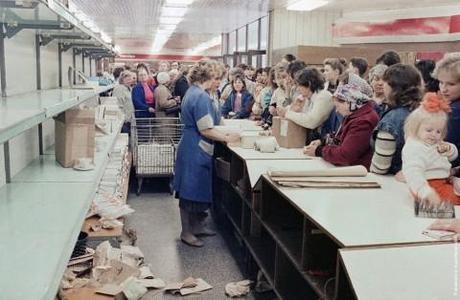
I’m not a devoted fan of Rush. My husband, on the other hand, has all the Rush lyrics memorized and he recently pointed out a song that stuck with me called Heresy. The song appears on Rush’s 1991 album Roll the Bones and talks about the fall of communism in Central and Eastern Europe – something I experienced first hand in Poland.
The song’s opening evokes familiar images from a quarter century ago of the unthinkable becoming real: the Berlin Wall coming down…
“All around that dull gray world
From Moscow to Berlin
People storm the barricades
Walls go tumbling in”
But the song doesn’t dwell on that dramatic moment of euphoria. Instead, the mood shifts quickly to palpable anger over decades of oppression, poverty, and life in fear that spanned both sides of the Iron Curtain due to the ever-present nuclear threat.
Here is how Rush’s lyricist Neil Peart explained his reasons behind writing the song, “The deconstruction of the Eastern Bloc made some people happy. It made me mad. (…) it was all a mistake? A heavy price to pay for somebody else’s misguided ideology, it seems to me, and that waste of life must be the ultimate heresy.”
“The counter-revolution
People smiling through their tears
Who can give them back their lives
And all those wasted years?
All those precious wasted years
Who will pay?”
For someone who hasn’t experienced empty store shelves (save vinegar and matches) or standing in line for hours just to buy toilet paper, the absurdity that communism brought into the daily lives of people must be hard to fathom. And all these individual struggles over the years have added up to a macro-level damage that countries in Central and Eastern Europe are still trying to undo in order to “catch up” with the West.
Let’s look at Poland. In the 1920s and 1930s the country was by no means rich, having just regained independence on November 11, 1918 after 123 years of partitions. Poland’s GDP per capita in 1937 ($ in 1990 international prices) was about a half to a third of major Western European economies: $1,916 compared to $4,836 in Germany, $6,249 in the United Kingdom, and $4,207 in France. It was comparable to Portugal ($1,753), Spain ($1,799), or Greece ($2,509).
WWII brought incredible devastation in terms of industrial base, infrastructure, and human capital. But arguably the most damaging outcome of the war was the imposition of the communist system on the Polish economy: central planning, abolition of private enterprise, and destruction of market institutions.
The contrast is clearly visible in comparison with Western Europe, where the war also brought extensive physical losses but the market economy became the engine of recovery, having received a shot in the arm in terms of needed capital through the Marshall Plan. For political reasons, the new communist government of Poland rejected the offer of help under the Marshall Plan and instead turned toward the collectivization of large parcels of land, ill-informed investments in heavy industry, and isolation from world markets.
The result? Wasted decades of economic decay that ultimately boiled over in 1989 – and the recovery is still ongoing. By 2012, according to the World Bank data, Poland’s GDP per capita was $12,708, compared to $41,514 in Germany, $38,514 United Kingdom, and $39,772 in France – essentially preserving the pre-WWII ratio. At the same time, countries that in 1937 were at a similar development level but found themselves on the free market side of the post-war divide doubled their GDP per capita vis-à-vis Poland: Portugal $20,182, Spain $29,195, Greece $22,083.
The economic bankruptcy of communism was a key factor contributing to its downfall in Central and Eastern Europe. As Rush put it,
“The counter-revolution
At the counter of a store
People buy the things they want
And borrow for a little more
All those wasted years
All those precious wasted years
Who will pay?”
Misguided ideology trumping economic freedom was indeed the ultimate heresy. And even 24 years after the fall of the Berlin Wall and the beginning of the political and economic transformation in the region, its people are still paying for it.
Anna Nadgrodkiewicz is Director of Multiregional Programs at CIPE.

